- Home
- Harlan Ellison
Angry Candy Page 18
Angry Candy Read online
Page 18
And he made one last feeble gesture to show me where the scroll was hidden. The scroll he had brought back, which had contained such knowledge as had permitted him to indulge his hobby. He made that last feeble gesture, urging me to find the scroll and to remove it from its hidden niche, and to use it for ends that would palliate his life's doings.
I tried to turn him over, to learn more, but he died in my arms. And I left him there in the narrow aisle among the Nazi Werewolves and Royal Welsh Fusiliers; and I threaded my way through the drawing room large enough to stage a cotillion; and I found the secret panel behind which he had secreted the scroll; and I removed it and saw the photograph he had taken in that beyond that lay beyond the beyondmost edge; the only image of that land that has ever existed. The whispering moon. The golden mushroom trees. The satin sea. The creatures that sit and ruminate there.
I took the scroll and went far away. Into the Outback, above Arkaroo Rock where the Dreamtime reigns. And I spent many years learning the wisdom contained in the scroll of Mr. Brown.
It would not be hyperbole to call it an epiphany.
For when I came back down, and re-entered the human stream, I was a different Vizinczey. I was recast in a different nature. All that I had been, all that I had done, all the blight I had left in my track . . . all of it was as if from someone else's debased life. I was now equipped and anxious to honor Mr. Brown's dying wish.
And that is how I have spent my time for the past several lifetimes. The scroll, in a minor footnote, affords the careful reader the key to immortality. Or as much immortality as one desires. So with this added benison of longevity, I have expended entire decades improving the condition of life for the creatures of this world that formerly I savaged and destroyed.
Now, due to circumstances I will not detail (there is no need to distress you with the specifics of vegetables and rust), the time of my passing is at hand. Vizinczey will be no more in a very short while. And all the good I have done will be the last good I can do. I will cease to be, and I will take the scroll with me. Please trust my judgment in this.
But for a very long time I have been your guardian angel. I have done you innumerable good turns. Yes, even you reading these words: I did you a good turn just last week. Think back and you will remember a random small miracle that made your existence prettier. That was I.
And as parting gift, I have extracted a brief number of the most important thoughts and skills from the scroll of the Promontorium Sacrum. They are the most potent runes from that astonishing document. So they will not burn, but rather will serve to warm, if properly adduced, if slowly deciphered and assimilated and understood, I have couched them in more contemporary, universal terms. I do this for your own good. They are not quite epigraphs, nor are they riddles; though set down in simple language, if pierced to the nidus they will enrich and reify; they are potentially analeptic.
I present them to you now, because you will have to work your lives without me from this time forward. You are, as you were for millennia, alone once again. But you can do it. I present them to you, because from the moment Mr. Brown died in my arms, I have been unable to forget the look of human misery, endless despair, and hopelessness on the face of a Spartan soldier who lay on a carpet in a house in Sydney, Australia. This is for him, for all of them, and for you.
1
It's the dark of the sun. It's the hour in which worms sing madrigals, tea leaves tell their tales in languages we once used to converse with the trees, and all the winds of the world have returned to the great throat that gave them life. Messages come to us from the core of quiet. A friend now gone tries desperately to pass a message from the beyond, but the strength of ghosts is slight: all he can do is move dust-motes with great difficulty, arranging them with excruciating slowness to form words. The message comes together on the glossy jacket of a book casually dropped on a table more than a year ago. Laboriously laid, mote by mote, the message tells the friend still living that friendship must involve risk, that it is merely a word if it is never tested, that anyone can claim friend if there is no chance of cost. It is phrased simply. On the other side, the shade of the friend now departed waits and hopes. He fears the inevitable: his living friend despises disorder and dirt: what if he chances on the misplaced book while wearing his white gloves?
2
Do they chill, the breezes that whisper of yesterday, the winds that come from a hidden valley near the top of the world? Do they bite, the shadowy thoughts that lie at the bottom of your heart during daylight hours, that swirl up like wood smoke in the night? Can you hear the memories of those who have gone before, calling to you when the weariness takes you, close on midnight? They are the winds, the thoughts, the voices of memory that prevail in the hour that lies between awareness and reverie. And on the other side of the world, hearing the same song, is your one true love, understanding no better than you, that those who cared and went away are trying to bring you together. Can you breach the world that keeps you apart?
3
This is an emergency bulletin. We've made a few necessary alterations in the status quo. For the next few weeks there will be no madness; no imbecile beliefs; no paralogical, prelogical or paleological thinking. No random cruelty. For the next few weeks all the impaired mentalities will be frozen in stasis. No attempts to get you to believe that vast and cool intelligences come from space regularly in circular vehicles. No runaway tales of yetis, sasquatches, hairy shamblers of a lost species. No warnings that the cards, the stones, the running water or the stars are against your best efforts. This is the time known in Indonesia as djam karet — the hour that stretches. For the next few weeks you can breathe freely and operate off these words by one who learned too late, by one who has gone away, who was called Camus: "It is not man who must be protected, but the possibilities within him." You have a few weeks without hindrance. Move quickly.
4
The casement window blows open. The nightmare has eluded the guards. It's over the spiked wall and it's in here with you. The lights go out. The temperature drops sharply. The bones in your body sigh. You're all alone with it. Circling with your back to the wall. Hey, don't be a nasty little coward; face it and disembowel it. You've got time. You have always had time, but the fear slowed you, and you were overcome. But this is the hour that stretches. . . and you've got a chance. After all, it's only your conscience come to kill you. Stop shivering and put up your dukes. You might beat it this time, now that you know you have some breathing space. For in this special hour anything that has ever happened will happen again. Except, this time, it's your turn to risk it all.
5
In the cathedral at the bottom of the Maracot Deep the carillon chimes for all the splendid thinkers you never got to be. The memories of great thoughts left unspoken rise from their watery tomb and ascend to the surface. The sea boils at their approach and a siege of sea eagles gathers in the sky above the disturbance. Fishermen in small boats listen as they have never listened before, and all seems clear for the first time. These are warnings of storms made only by men. Tempests and sea-spouts, tsunamis and bleeding oceans the color of tragedy. For men's tongues have been stilled, and more great thoughts will die never having been uttered. Memories from the pit of the Deep rise to lament their brethren. Even now, even in the hour that stretches, the past silently cries out not to be forgotten. Are you listening, or must you be lost at sea forever?
6
Did you have one of those days today, like a nail in the foot? Did the pterodactyl corpse dropped by the ghost of your mother from the spectral Hindenburg forever circling the Earth come smashing through the lid of your glass coffin? Did the New York strip steak you attacked at dinner suddenly show a mouth filled with needle-sharp teeth, and did it snap off the end of your fork, the last solid-gold fork from the set Anastasia pressed into your hands as they took her away to be shot? Is the slab under your apartment building moaning that it cannot stand the weight on its back a moment longer, and is the buildin
g stretching and creaking? Did a good friend betray you today, or did that good friend merely keep silent and fail to come to your aid? Are you holding the razor at your throat this very instant? Take heart, comfort is at hand. This is the hour that stretches. Djam karet. We are the cavalry. We're here. Put away the pills. Well get you through this bloody night. Next time, it'll be your turn to help us.
7
You woke in the night, last night, and the fiery, bony hand was enscribing mystic passes in the darkness of your bedroom. It carved out words in the air, flaming words, messages that required answers. One picture is worth a thousand words, the hand wrote. "Not in this life," you said to the dark and the fire. "Give me one picture that shows how I felt when they gassed my dog. I'll take less than a thousand words and make you weep for the last Neanderthal crouched at the cliff's edge at the moment he realized his kind were gone . . . show me your one picture. Commend to me the one picture that captures what it was like for me in the moment she said it was all over between us. Not in this life, Bonehand." So here we are, once again in the dark, with nothing between us in this hour that stretches but the words. Sweet words and harsh words and words that tumble over themselves to get born. We leave the pictures for the canvas of your mind. Seems only fair.
8
Rain fell in a special pattern. I couldn't believe it was doing that. I ran to the other side of the house and looked out the window. The sun was shining there. I saw a hummingbird bury his stiletto beak in a peach on one of the trees, like a junkie who had turned himself into the needle. He sucked deeply and shadows flowed out of the unripe peach: a dreamy vapor that enveloped the bird, changing its features to something jubilantly malevolent. With juice glowing in one perfect drop at the end of its beak, it turned a yellow eye toward me as I pressed against the window. Go away, it said. I fell back and rushed to the other side of the house where rain fell in one place on the sunny street. In my soul I knew that not all inclement weather meant sorrow, that even the brightest day held dismay. I knew this all had meaning, but there was no one else in the world to whom I could go for interpretation. There were only dubious sources, and none knew more than I, not really. Isn't that the damnedest thing: there's never a good reference when you need one.
9
Through the jaws of night we stormed, banners cracking against the icy wind, the vapor our beasts panted preceding us like smoke signals, warning the enemy that we looked forward to writing our names in the blood of the end of their lives. We rode for Art! For the singing soul of Creativity! Our cause was just, because it was the only cause worth dying for. All others were worth living for. They stood there on the black line of the horizon, their pikes angrily tilted toward us. For Commerce, they shouted with one voice. For Commerce! And we fell upon them, and the battle was high wave traffic, with the sound of metal on metal, the sound of hooves on stone, the sound of bodies exploding. We battled all through the endless midnight till at last we could see nothing but hills and valleys of dead. And in the end, we lost. We always lost. And I, alone, am left to tell of that time. Only I, alone of all who went to war to measure the height of the dream, only I remain to speak to you here in the settling silence. Why do you feel diminished . . . you weren't there . . . it wasn't your war. Hell hath no fury like that of the uninvolved.
10
Hear the music. Listen with all your might, and you needn't clap to keep Tinker Bell from going into a coma. The music will restore her rosy cheeks. Then seek out the source of the melody. Look long and look deep, and somewhere in the murmuring world you will find the storyteller, there under the cabbage leaves, singing to herself. Or is that a she? Perhaps it's a he. But whichever, or whatever, the poor thing is crippled. Can you see that now? The twisting, the bending, the awkward shape, the milky eye, the humped back, do you now make it out? But if you try to join in, to work a duet with wonder, the song ceases. When you startle the cricket its symphony ceases. Art is not by committee, nor is it by wish-fulfillment. It is that which is produced in the hour that stretches, the timeless time wherein all songs are sung. In a place devoid of electrical outlets. And if you try to grasp either the singer or the song, all you will hold is sparkling dust as fine as the butter the moth leaves on glass. How the bee flies, how the lights go on, how the enigma enriches and the explanation chills. . . how the music is made . . . are not things we were given to know. And only the fools who cannot hear the song ask that the rules be posted. Hear the music. And enjoy. But do not cry. Not everyone was intended to reach A above high C.
11
Ah, there were giants in the land in those days. There was a sweet-faced, honey-voiced girl named Barbara Wire, who we called Nancy because no one had the heart to call her Barb Wire. She tossed a salamander into a window fan to see what would happen. There was Sofie, who had been bitten by The Sun Also Rises at a tender age, and who took it as her mission in life to permit crippled virginal boys the enjoyment of carnal knowledge of her every body part: harelips, lepers, paraplegics, albinos with pink eyes, aphasiacs, she welcomed them all to her bed. There was Marissa, who could put an entire unsegmented fried chicken in her mouth all at once, chew without opening her lips or dribbling, and who would then delicately spit out an intact skeleton, as dry and clean as the Gobi Desert. Perdita drew portraits. She would sit you down, and with her pad and charcoal, quickly capture the depth and specificity of your most serious flaws of honor, ethic and conscience, so accurately that you would rip the drawing to pieces before anyone else could see the nature of your corruption. Jolanda: who stole cars and then reduced them to metal sculpture in demolition derbies, whose residence was in an abandoned car-crusher. Peggy: who never slept but told endlessly of her waking dreams of the things the birds told her they saw from on high. Naomi: who was white, passing for black, because she felt the need to shoulder some of the guilt of the world. Ah, there were giants in the land in those days. But I left the room, and closed the door behind me so that the hour that stretches would not leak out. And though I've tried portal after portal, I've never been able to find that room again. Perhaps I'm in the wrong house.
12
I woke at three in the morning, bored out of sleep by dreams of such paralyzing mediocrity that I could not lie there and suffer my own breathing. Naked, I padded through the silent house: I knew that terrain as my tongue knows my palate. There were rolls of ancient papyrus lying on a counter. I will replace them, high in a dark closet, I thought. Then I said it aloud . . . the house was silent, I could speak to the air. I took a tall stool and went to the closet, and climbed up and replaced the papyrus. Then I saw it. A web. Dark and billowing in the corner of the ceiling, not silvery but ashy. Something I could not bear to see in my home. It threatened me. I climbed down, moved through the utter darkness, and struggled with the implements in the broom closet, found the feather duster, and hurried back. Then I killed the foaming web and left the closet. Clean the feather duster, I thought. In the back yard I moved to the wall, and shook it out. Then, as I returned, incredible pain assaulted me. The cactus pup with its cool, long spikes had imbedded itself in the ball of my naked right foot. My testicles shrank and my eyes watered. I took an involuntary step, and the spines drove deeper. I reached down to remove the agony and a spike imbedded itself in my thumb. I shouted. I hurt. Limping, I got to the kitchen. In the light of the kitchen I tried to pinch out the spines. They were barbed. They came away with bits of flesh attached. The poison was already spreading. I hurt very much. I hobbled to the bathroom to put antiseptic or the Waters of Lethe on the wounds. They bled freely. I salved myself, and returned to the bed, hating my wife who slept unknowing; I hated my friend who lay dreaming in another part of the house. I hated the world for placing random pain in my innocent path. I lay down and hated all natural order for a brief time. Then I fell fast asleep. Relieved. Boredom had been killed with the billowing web. Somehow, the universe always provides.
13
Like all men, my father was a contradiction in terms. Not more tha
n two or three years after the Great Depression, when my family was still returning pop bottles for the few cents' deposit, and saving those pennies in a quart milk bottle, my father did one of the kindest things I've ever known: he hired a man as an assistant in his little store; an assistant he didn't really need and couldn't afford. He hired the man because he had three children and couldn't find a job. Yet not more than a week later, as we locked up the stationery shop late on a Saturday night, and began to walk down the street to the diner where we would have our hot roast beef sandwiches and french fries, with extra country gravy for dipping the fries, another man approached us on the street and asked for twenty-five cents to buy a bowl of soup. And my father snarled, "No! Get away from us!" I was more startled at that moment than I had ever been — or ever would be, as it turned out, for my father died not much later that year — more startled than by anything my father had ever said or done. If I had known the word at that age — I was only twelve — I would have realized that I was dumbfounded. My gentle father, who never raised his voice to me or to anyone else, who was unfailingly kind and polite even to the rudest customer, who has forever been a model of compassion for me, my father had grown icy and stony in that exchange with an innocent stranger. "Dad," I asked him, as we walked away from the lonely man, "how come you didn't give that fellah a quarter for some soup?" He looked down at me, as if through a crack in the door of a room always kept locked, and he said, "He won't buy a bowl of soup. He'll only buy more liquor." Because my father never lied to me, and because I knew it was important for him always to tell me the truth, I didn't ask anything more about it. But I never forgot that evening; and it is an incident I can never fit into the film strip of loving memories I run and rerun starring my father. Somehow I feel, without understanding, that it was the most important moment of human frailty and compassion in the twelve years through which I was permitted to adore my father. And I wonder when I will grow wise enough to understand the wisdom of my father.

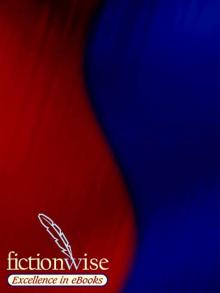 Repent, Harlequin! Said the Ticktockman
Repent, Harlequin! Said the Ticktockman Broken Glass
Broken Glass Other Glass Teat
Other Glass Teat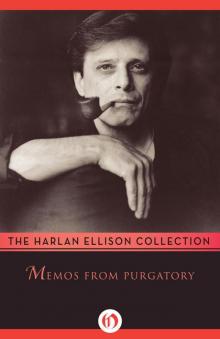 Memos From Purgatory
Memos From Purgatory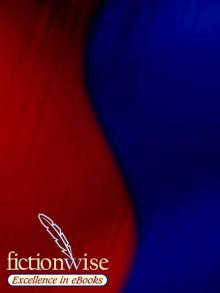 I Have No Mouth and I Must Scream
I Have No Mouth and I Must Scream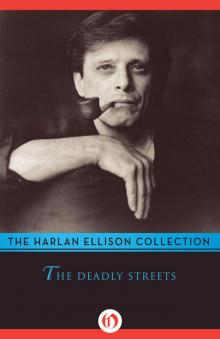 The Deadly Streets
The Deadly Streets The Glass Teat
The Glass Teat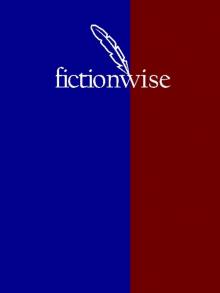 Paingod and Other Delusions
Paingod and Other Delusions No Doors No Windows
No Doors No Windows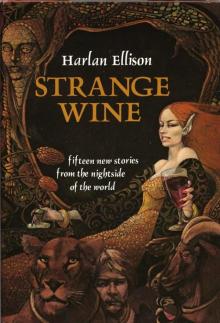 Strange Wine
Strange Wine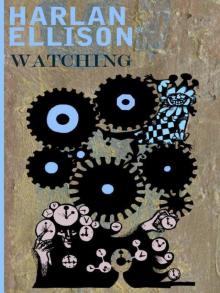 Harlan Ellison's Watching
Harlan Ellison's Watching Over the Edge/An Edge in My Voice
Over the Edge/An Edge in My Voice Troublemakers: Stories by Harlan Ellison
Troublemakers: Stories by Harlan Ellison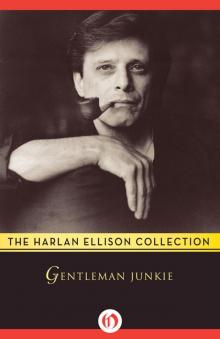 Gentleman Junkie and Other Stories of the Hung-Up Generation
Gentleman Junkie and Other Stories of the Hung-Up Generation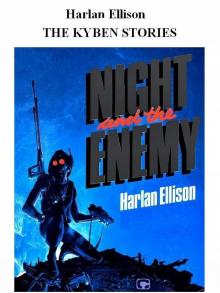 The Kyben Stories
The Kyben Stories From the Land of Fear
From the Land of Fear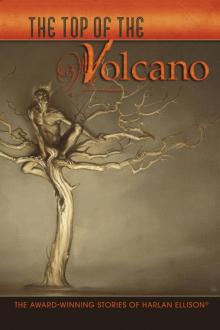 The Top of the Volcano: The Award-Winning Stories of Harlan Ellison
The Top of the Volcano: The Award-Winning Stories of Harlan Ellison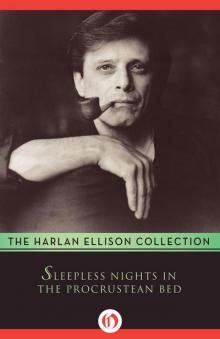 Sleepless Nights in the Procrustean Bed
Sleepless Nights in the Procrustean Bed Ellison Wonderland
Ellison Wonderland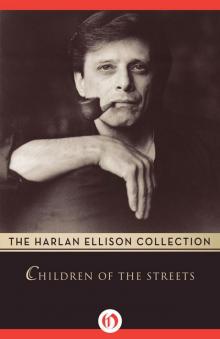 Children of the Streets
Children of the Streets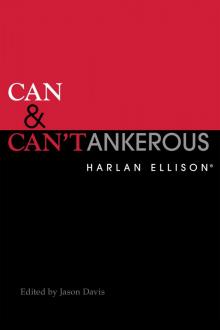 Can & Can'tankerous
Can & Can'tankerous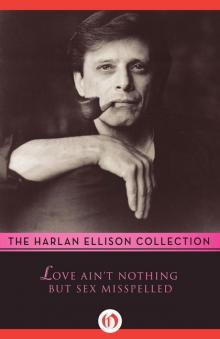 Love Ain't Nothing but Sex Misspelled
Love Ain't Nothing but Sex Misspelled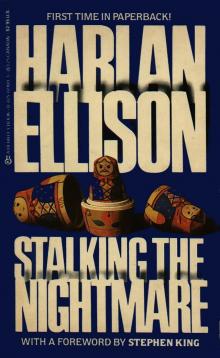 Stalking the Nightmare
Stalking the Nightmare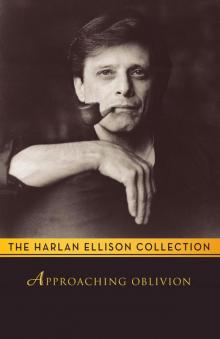 Approaching Oblivion
Approaching Oblivion Deathbird Stories
Deathbird Stories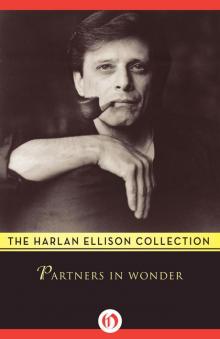 Partners in Wonder
Partners in Wonder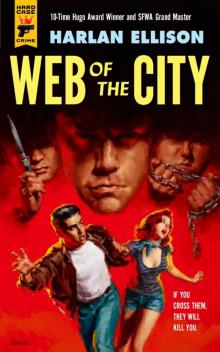 Web of the City
Web of the City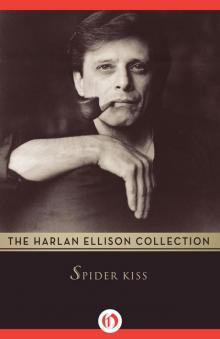 Spider Kiss
Spider Kiss A Boy and His Dog
A Boy and His Dog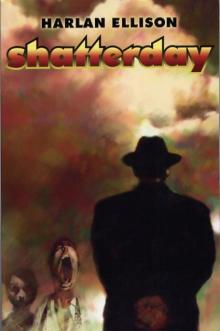 Shatterday
Shatterday Slippage: Previously Uncollected, Precariously Poised Stories
Slippage: Previously Uncollected, Precariously Poised Stories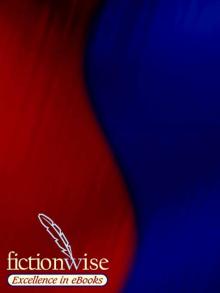 Repent, Harlequin! Said the Ticktockman
Repent, Harlequin! Said the Ticktockman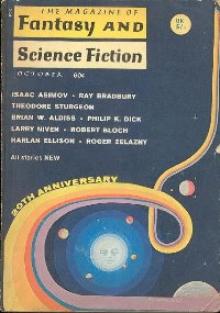 Come to Me Not in Winter's White
Come to Me Not in Winter's White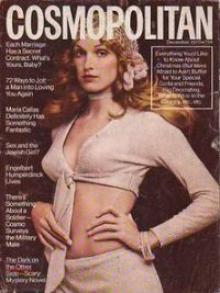 The Song the Zombie Sang
The Song the Zombie Sang The Other Glass Teat
The Other Glass Teat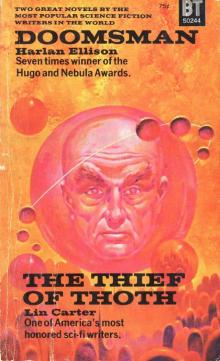 Doomsman - the Theif of Thoth
Doomsman - the Theif of Thoth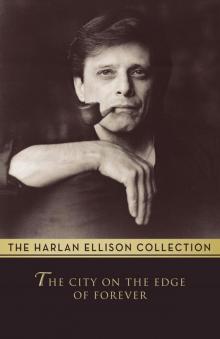 The City on the Edge of Forever
The City on the Edge of Forever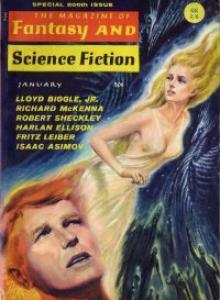 I See a Man Sitting on a Chair, and the Chair Is Biting His Leg
I See a Man Sitting on a Chair, and the Chair Is Biting His Leg The Harlan Ellison Hornbook
The Harlan Ellison Hornbook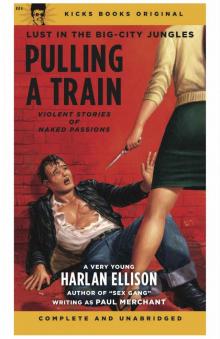 Pulling A Train
Pulling A Train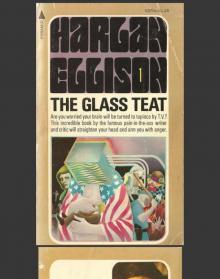 The Glass Teat - essays of opinion on the subject of television
The Glass Teat - essays of opinion on the subject of television An Edge in My Voice
An Edge in My Voice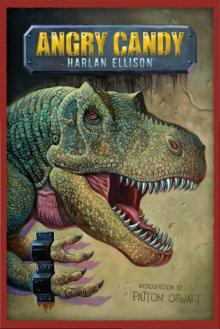 Angry Candy
Angry Candy Troublemakers
Troublemakers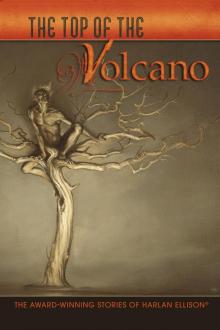 The Top of the Volcano
The Top of the Volcano Over the Edge
Over the Edge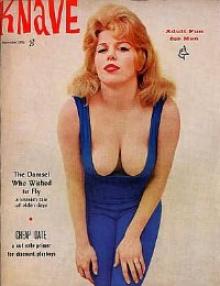 Survivor #1
Survivor #1 Slippage
Slippage